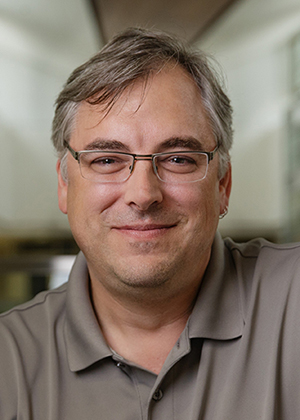Fearless on every front: Fighting PTSD
In honor of Fearless Month, the College of Liberal Arts would like to shine a spotlight on Steve Maren, a researcher committed to studying PTSD—a disorder marked by intense fear and anxiety that affects nearly 8 million adults a year.

by Heather Rodriguez ’04

Torrential hurricanes. Military deployments. Increasing instances of gun violence. Let’s face it—there are many reasons why cases of post-traumatic stress disorder (PTSD) are on the rise. It’s also why the research done by Steve Maren, the Claude H, Everett, ’47 Jr. Chair of Liberal Arts and professor of psychology, is more important than ever.
Maren researches a network of brain areas (hippocampus, amygdala, and prefrontal cortex) to understand the neurobiology behind anxiety disorders and PTSD. This network is responsible for emotional memory, which is what causes people suffering from PTSD to pathologically re-experience a traumatic event.
“They’re sitting there, and they hear a noise, and suddenly they find themselves back in the situation where an IED went off and they see the carnage and feel again that their life is threatened,” Maren, who was recently named a Presidential Impact Fellow in the College of Liberal Arts, said. “Or they re-live a car accident or an attempted assault. Anything where a person feels in serious danger can cause PTSD.”
In recognition of his groundbreaking work, Maren has received many accolades during his career. Most recently, the Brain and Behavior Research Foundation (BBRF) selected him to join their small council of esteemed scientists that includes Nobel laureates and National Medal of Science recipients.
Led by founding and current president Herbert Pardes, the council reviews and selects the most promising research ideas with the greatest potential to lead to breakthroughs. Over the last 30 years, the 168-member Scientific Council has reviewed more than 25,000 grant applications, representing an estimated $19 million in volunteer contribution of service.
“It is an honor to join the BBRF Scientific Council to help serve its mission to support the most promising research on the biological basis of mental disorders,” Maren said. “I have no doubt that these efforts will go a long way to relieve the burden that mental illness levies on afflicted individuals, their families, and society at large.”
For additional resources to further help those challenged by PTSD issues, we recommend visiting the PTSD Recovery Program: http://www.recovery.org/topics/ptsd/.
